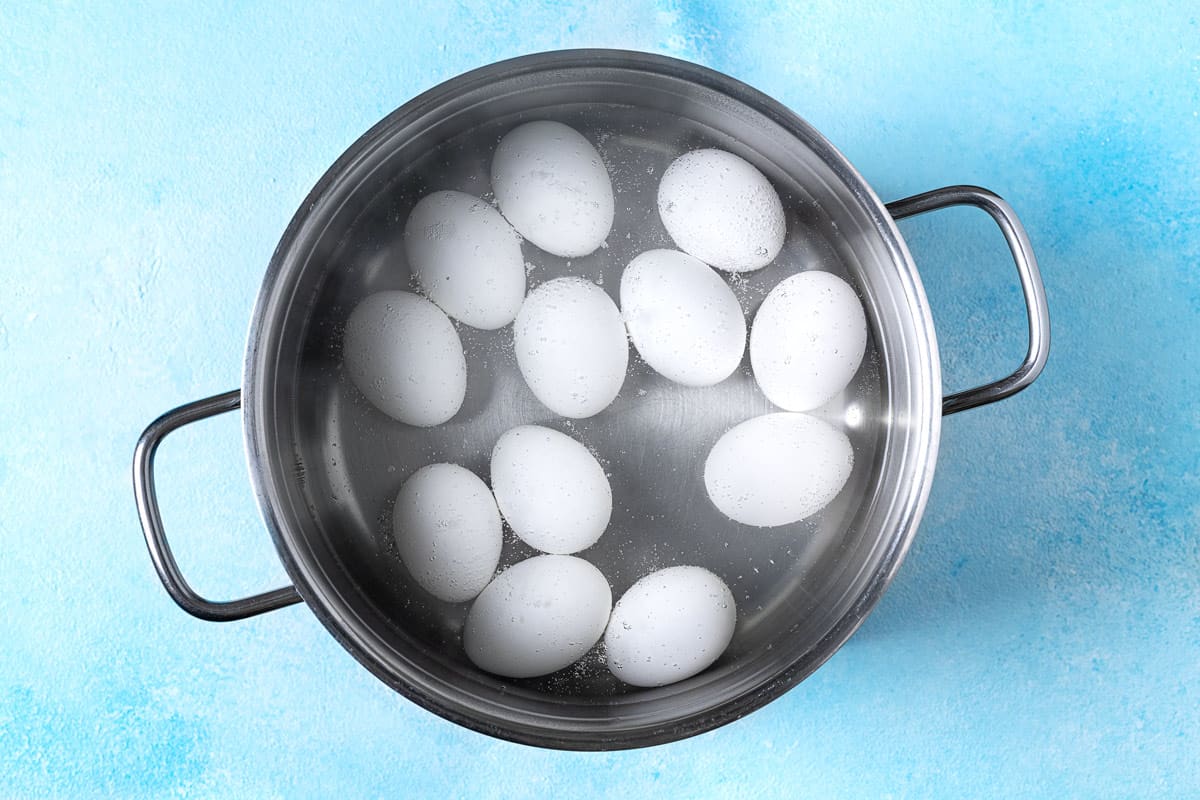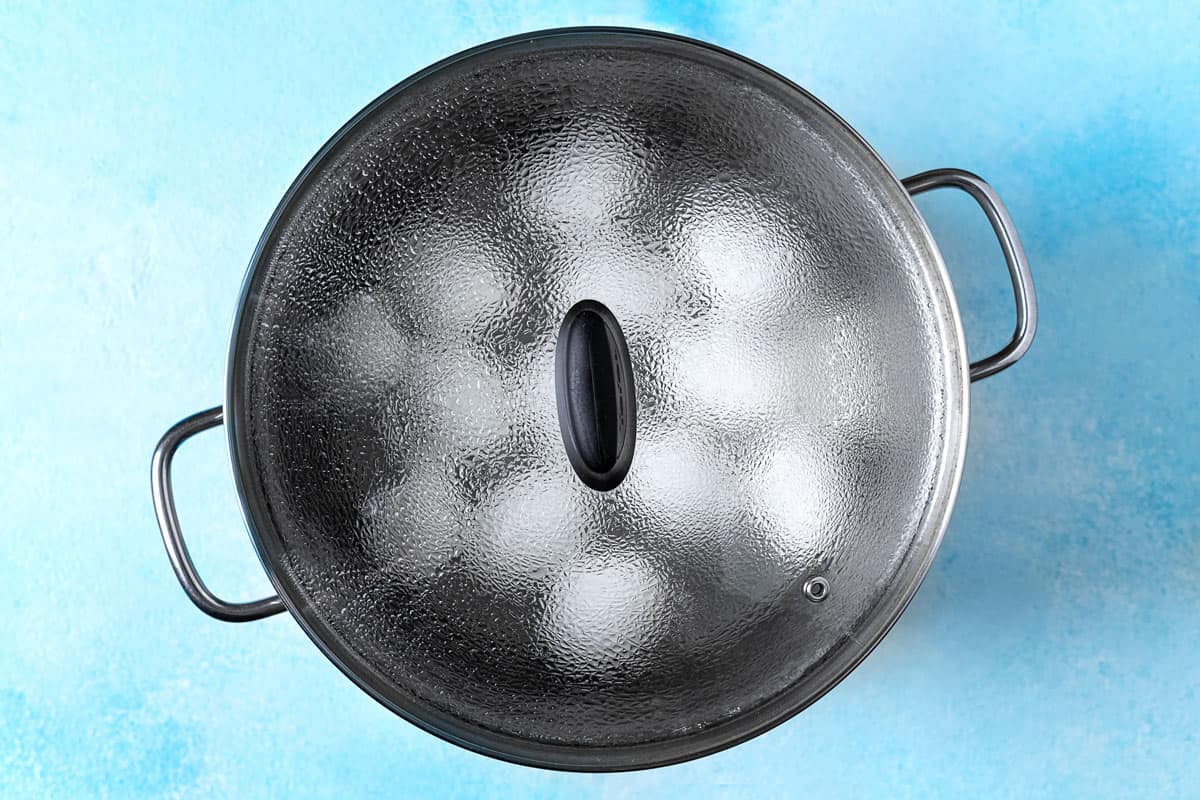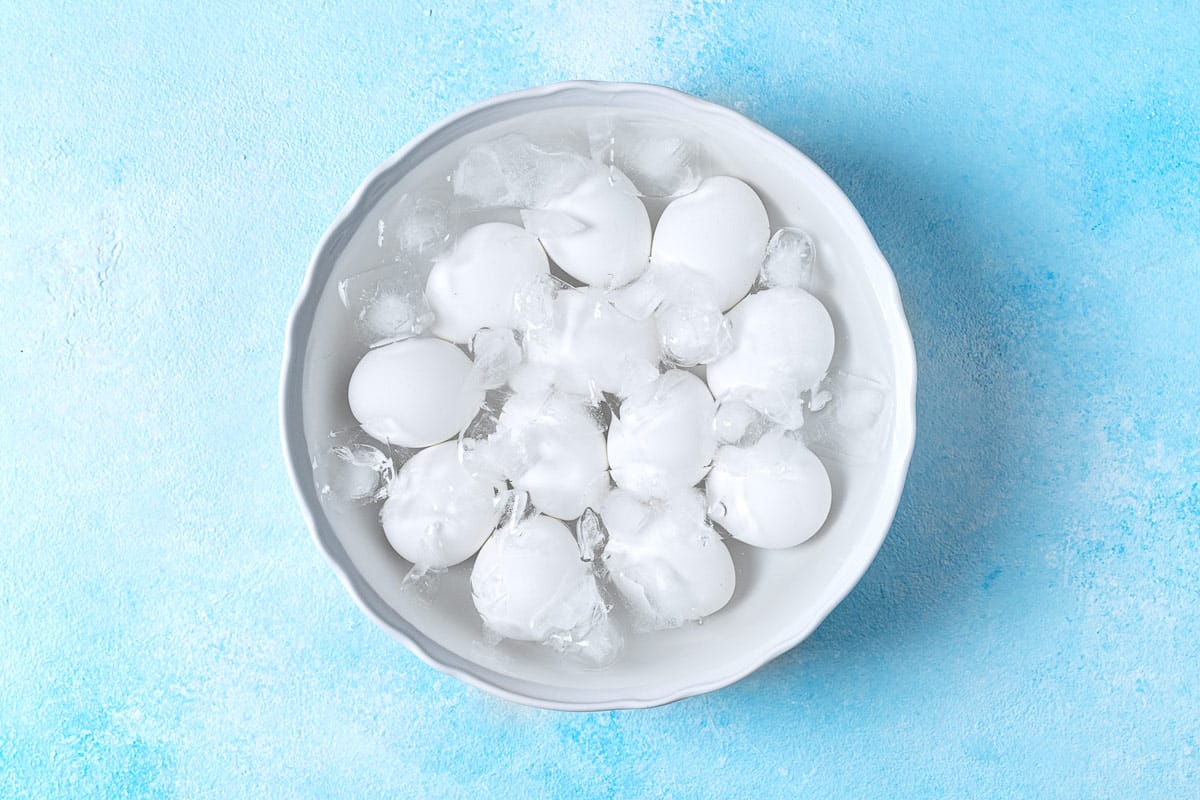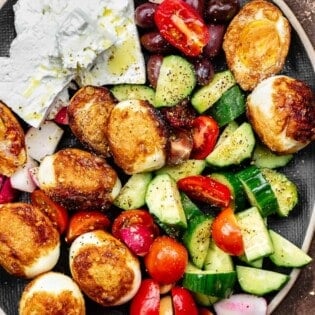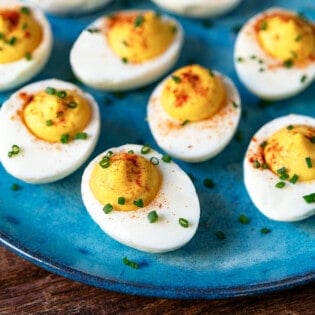In this guide, we cover all the tricks for making the creamiest boiled eggs from soft to hard yolks, how to peel boiled eggs (the easiest way), how to store them and our favorite egg recipes.
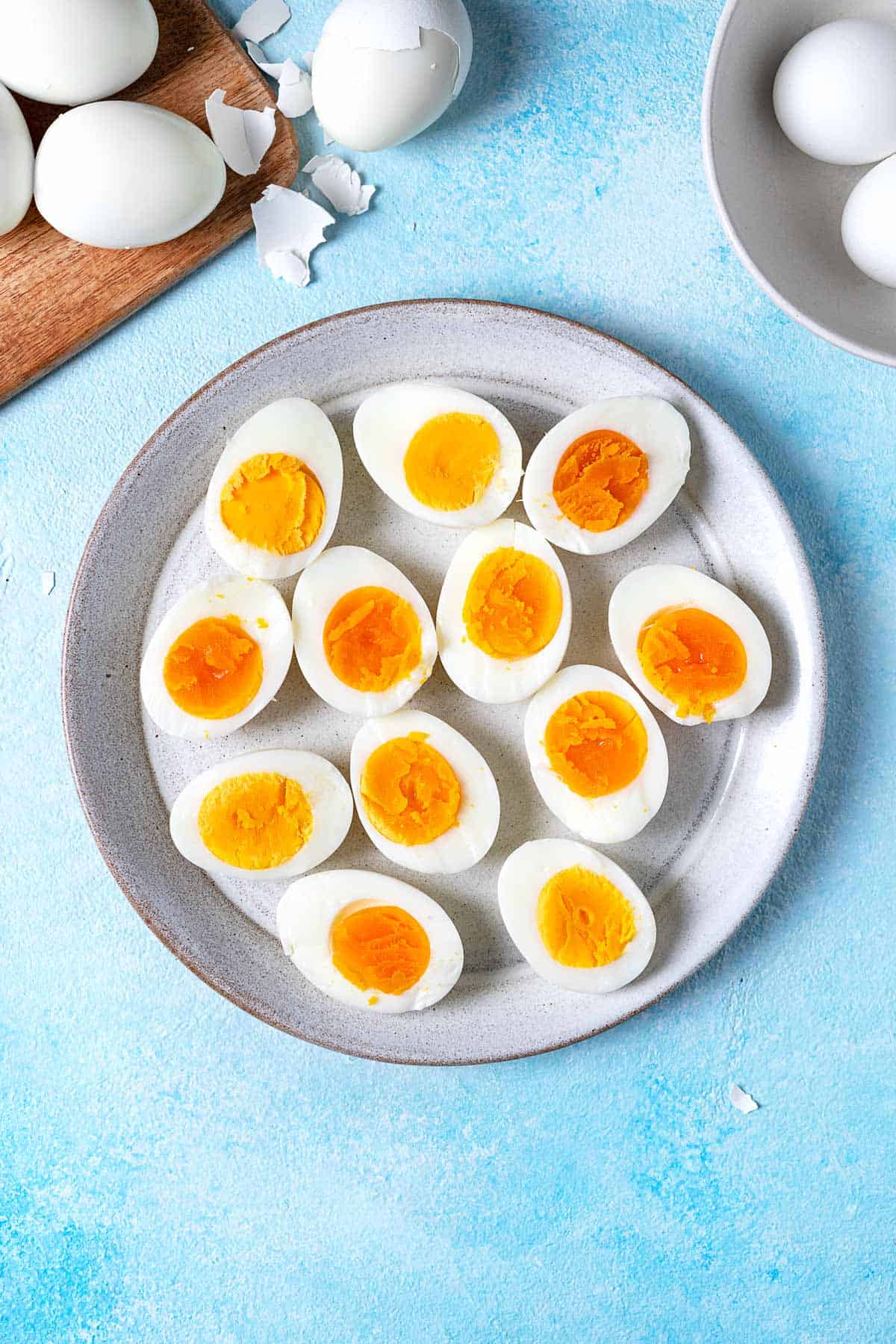
Cooking boiled eggs the right way is the difference between chalky and bland and flavorful and delicious! It’s the secret to taking everything from Egyptian Fried Eggs to Avocado Egg Salad to the next level.
Keep hard boiled eggs at the ready to make weeknight meals easy and nutritious. They’re an excellent low-carb, vegetarian source of protein: The US Department of Agriculture classifies one egg as having over 6 grams of protein and under 1/2 gram of carbohydrates.
Slice or tear them in half to top salads, like Radicchio Salad, potatoes, roasted vegetables, and more. You can even grate them to make breakfast pizza! And a hard boiled egg or two upgrades a simple side dish into a full, satisfying meal.
Table of Contents
How to Make Boiled Eggs
The best way to boil eggs is with a slow boil into a cold plunge. The slow boil prevents the eggs from breaking. The ice bath prevents both overcooking and that dreaded gray ring around the yolk! Here are the three tried-and-true steps for the perfect eggs every time. If you want jammy or soft boiled eggs follow the times in the next section.
- Bring to a boil: Carefully place your eggs in a saucepan in one single layer. Cover with at least one inch of cold water, and add 1/2 teaspoon of salt to the water. This stops the egg from leaking if any small cracks occur. Set on high heat to bring to a rolling boil.
- Let sit: As soon as the water is boiling fast and hard, turn off the heat and cover. Set a timer for 10 minutes. Fill a large bowl with ice water and set it next to your stove.
- Chill: As soon as the timer goes off, use a slotted spoon to transfer the eggs to the ice bath. This will stop them from continuing to cook from residual heat.
How Long to Boil Eggs: Soft, Medium, and Hard
Boiled eggs every which way should have a fully cooked egg white. The main difference between hard, soft, and medium egg is in the yolk.
- Soft boiled eggs are cooked for 4-6 minutes. They have a fully uncooked and runny yolk. They’re ideal for topping soups, like Lablabi (Tunisian Chickpea Stew) or Mediterranean Breakfast Bowls. The runny yolk adds a richness and silky texture to the broth.
- Medium boiled eggs are cooked for 7-8 minutes. They have a jammy, semi-cooked yolk that’s delicious on toast, like Mediterranean-Style Breakfast Toast.
- Hard boiled eggs are cooked for 9-12 minutes. The best hard boiled eggs are cooked all the way through but not until they’re dry and gray. I love grating them for Savory Yogurt Bowls, on top of Breakfast Pizza, and more. See my favorite recipes below!
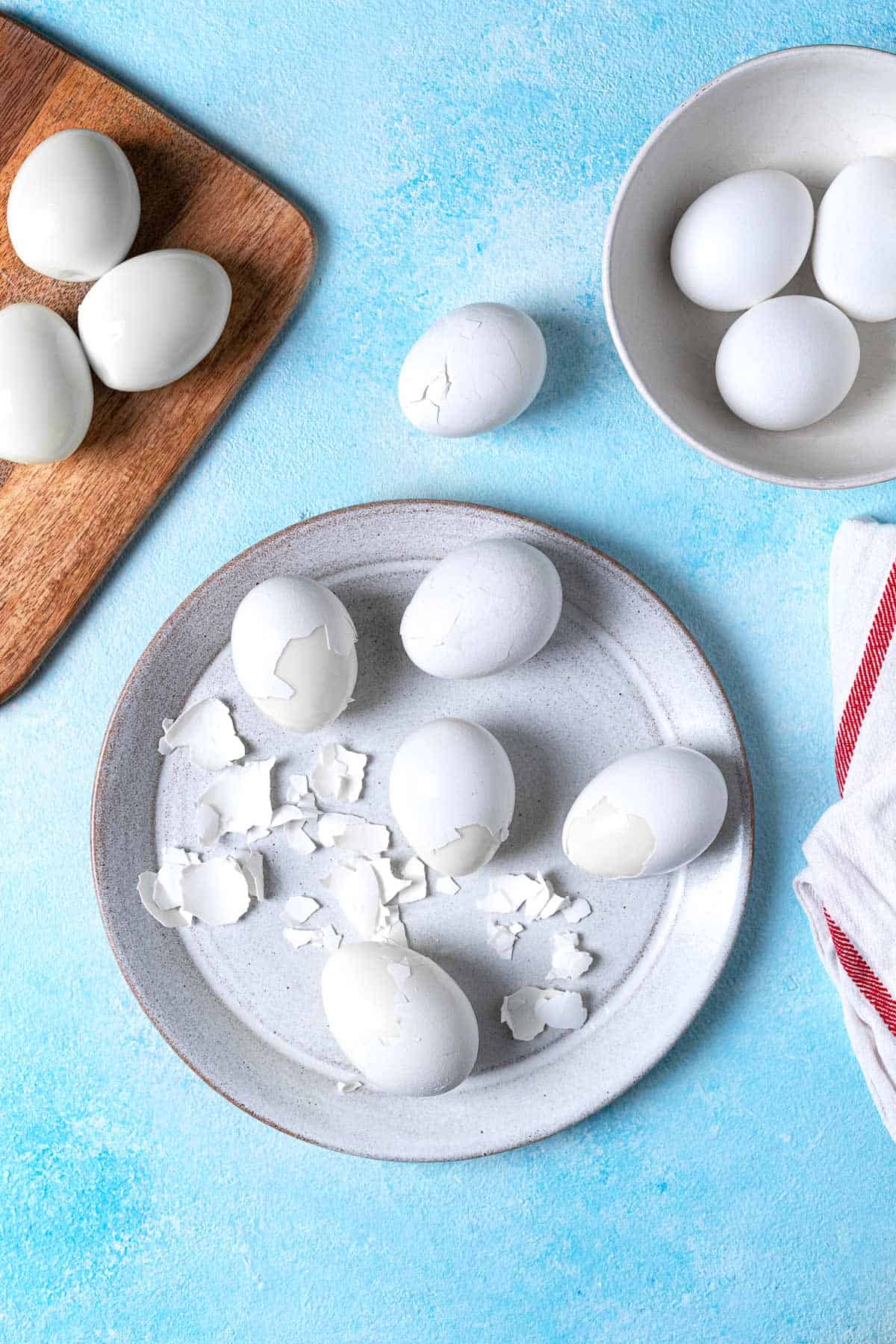
How to Peel Boiled Eggs
There are about a million ways to peel an egg, my favorite being the crack all over approach! To easily peel a hard boiled egg:
- Get ready: Set your bowl of eggs in ice water next to a sturdy sauce pot. Line a plate with paper towels.
- Peel: Crack the egg all over on the side of the pot, then peel into the pot. Alternatively, the roll method is effective. Crack the egg on a hard surface, like a countertop, then roll with steady pressure to crack all over. Remove the shell.
- Clean: Dunk the peeled egg back into the ice water to remove any stubborn pieces of shell. Set aside on your paper towel-lined plate until you’re ready to use. Repeat with the remaining eggs, discarding the shells at the end.
How to Store Boiled Eggs
Unpeeled hard boiled eggs will stay fresh for up to one week. Make a big batch on Sunday to have an easy and healthy protein source all week long.
To store, let them cool to room temperature. Set them in a sealed container in your refrigerator.
A tight seal and leaving the eggs in their shell will keep them fresh—and avoid a funky smell in your fridge. If you’re storing peeled eggs, make sure they’re well sealed and consume them within two days.
Extra Tips for Boiling Eggs
This is a no-fail hard boiled egg recipe. Here are some extra tips to make boiling and peeling eggs even easier.
- Use older eggs: It’s easier to peel eggs that are slightly older. As the egg ages, the membrane between the shell and the egg white begins to break down. The shell gets more independent and less clingy as it grows up! Use the eggs that aren’t fresh from the farm or store (but, of course, aren’t spoiled).
- Work over a bowl, not a trash can. This is a great general rule for any home cook! Collect any discards, like onion skins or egg shells, into a bowl, saucepot, or tupperware container. Then, discard at the end of cooking. This will prevent any slippery situations from ending up in your trash. And, it’s faster, cleaner, and more efficient.
- Don’t try to boil all your eggs at once. If you overcrowd the pot, the eggs will knock into each other and break. Only boil the amount that easily fits in your pot in one layer.
- Find your perfect egg. Everyone should go on their own individual egg journey. Your perfect egg may be 9 minutes and 45 seconds. Experiment with timing to find your recipe.
Get Eggy with It!
Appetizer and Mezze
Healthy Deviled Eggs
Vegetarian
Avocado Egg Salad
Mediterranean Diet Recipes
Healthy Egg Salad, Mediterranean-Style
Browse all Mediterranean recipes.
Visit Our Shop

The Mediterranean Dish Cookbook
The Mediterranean Dish Cookbook: 120 Bold and Healthy Recipes You’ll Make on Repeat. In her book, Suzy shares easy-to-find ingredients and easy-to-follow recipes, to make your meals more vibrant, delicious, and a little healthier, too!
How to Boil Eggs

Ingredients
- 12 eggs
- 1/2 teaspoon salt optional
Instructions
- Bring to a boil: Carefully lay your eggs on their side in a saucepan in one single layer. Cover with at least one inch of cold water. Add 1/2 teaspoon of salt to the water to prevent leaking. Set on high heat to bring to a rolling boil.
- Let sit: As soon as the water is at a full boil, turn off the heat and cover. Set a timer: 10 minutes for hard boiled, 8 minutes for medium/jammy, and 6 minutes for soft boiled. Fill a large bowl with ice water and set it next to your stove.
- Chill: As soon as your timer goes off, use a slotted spoon to transfer the eggs to the ice bath. Peel and use immediately, or store in their shell, covered in the refrigerator, for up to one week.
Video
Notes
- Don’t use your freshest eggs: older eggs are easier to peel.
- It’s easier to peel the egg if you crack it all over.
- Visit our shop to browse quality Mediterranean ingredients including olive oils, honey, jams and spices.



